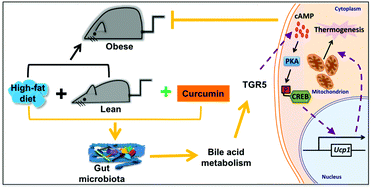Gut microbiota mediates the effects of curcumin on enhancing Ucp1-dependent thermogenesis and improving high-fat diet-induced obesity†
Abstract
Due to extremely poor systemic bioavailability, the mechanism by which curcumin increases energy expenditure remains unelucidated. Accumulating evidence suggests a strong association between the gut microbiota (GM) and energy metabolism. We investigated whether the GM mediates the effects of curcumin on improving energy homeostasis. High-fat diet (HFD)-fed wild type, uncoupling protein 1 (Ucp1) knockout and G protein-coupled membrane receptor 5 (TGR5) knockout mice were treated with curcumin (100 mg kg−1 d−1, p.o.). Curcumin-treated HFD-fed mice displayed decreased body weight gain and augmented cold tolerance due to enhanced adaptive thermogenesis as compared with that in control mice. The anti-obesity effects of curcumin were abolished by Ucp1 knockout. 16S ribosomal DNA sequencing analysis revealed that curcumin restructured the GM in HFD-fed mice. Fecal microbiota transplantation (FMT) and endogenous GM depletion indicated that the GM mediated the enhanced effect of curcumin on Ucp1-dependent thermogenesis. Curcumin altered bile acid (BA) metabolism with increased fractions of circulating deoxycholic acid (DCA) and lithocholic acid (LCA), which are the two most potent ligands for TGR5. Consistently, the enhanced effect of curcumin on Ucp1-dependent thermogenesis was eliminated by TGR5 knockout. Curcumin requires the GM and TGR5 to activate the cyclic adenosine monophosphate (cAMP)/protein kinase A (PKA) signaling pathway in thermogenic adipose tissue. Here, we demonstrated that the GM mediates the effects of curcumin on enhancing Ucp1-dependent thermogenesis and ameliorating HFD-induced obesity by influencing BA metabolism. We disclosed the potential of nutritional and pharmacologic manipulations of the GM to enhance Ucp1-dependent thermogenesis in the prevention and treatment of obesity.



 Please wait while we load your content...
Please wait while we load your content...